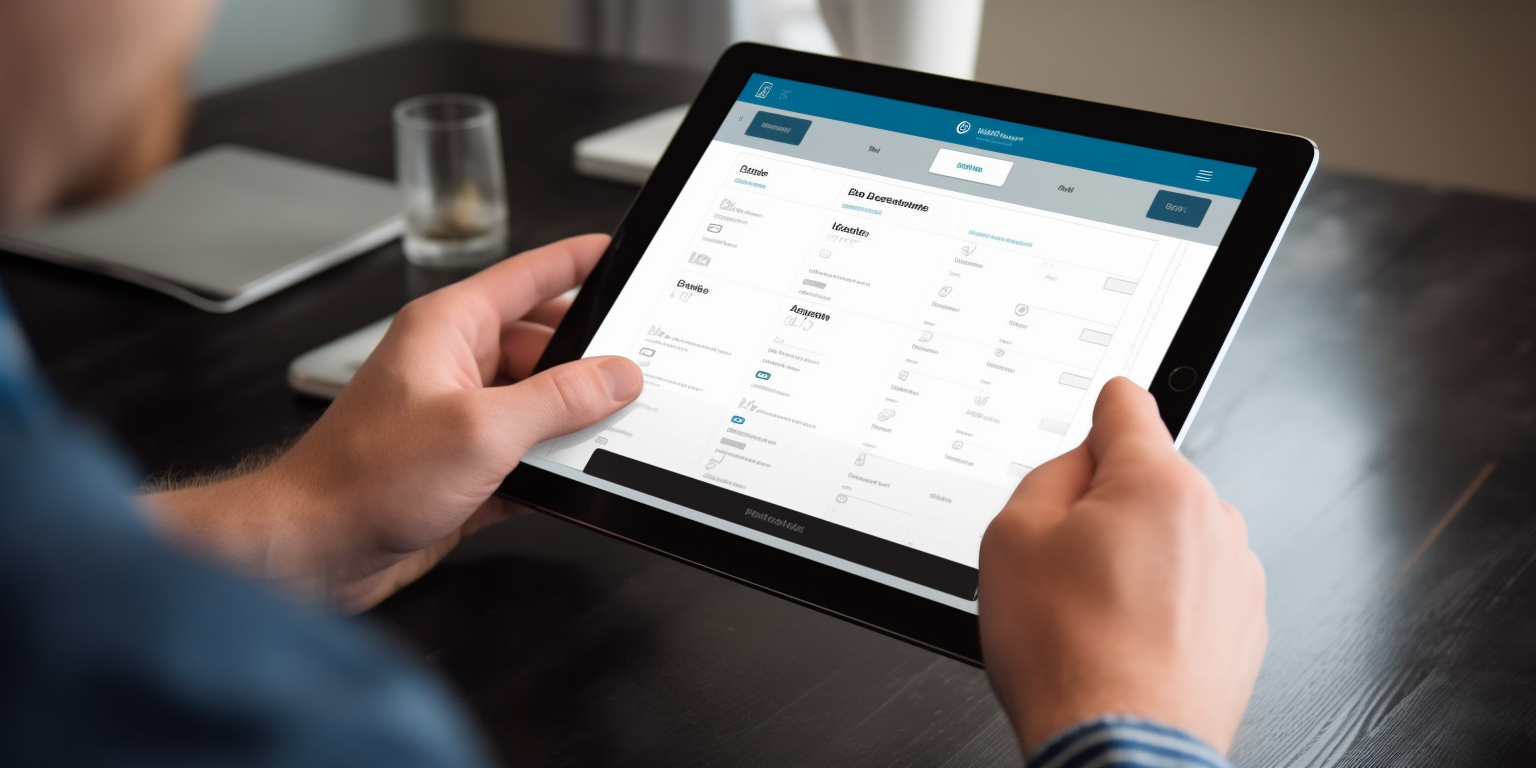A Construction Software App is a digital solution specifically designed to simplify the complexities faced in the construction industry. This tool, created for architects, engineers, contractors, and other construction professionals, aims to streamline processes and enhance productivity.
Crafted to tackle varied tasks in the construction realm, these apps encompass features like project management, resource allocation, budget tracking, and scheduling. They offer a one-stop solution, helping industry professionals handle multiple aspects of a construction project within a single, intuitive platform.
With a Construction Software App, contractors can effectively manage their teams and tasks, ensuring projects stay on schedule and within budget. For architects and engineers, these apps serve as a hub for collaborative design, facilitating seamless communication and real-time updates.
The value of these apps is not limited to just professionals. They were also created with clients in mind, providing a transparent view of the project’s progress at any given time. This transparency fosters trust, as clients can easily monitor project details like cost, timeline, and quality of work.
How can construction software apps streamline project management?
Construction software apps are the catalysts for efficiency in project management. They bring the power of technology on the job site, providing tools to simplify complex processes and organize disparate information.
Through these apps, project managers can seamlessly track project progress in real time. By capturing data directly from the field, they can quickly address issues and mitigate risks. This real-time visibility leads to timely decision making and keeps projects on track.
In addition, the apps serve as a centralized hub for all project-related information. Blueprints, specifications, invoices, and change orders, among other documents, can be stored and accessed in one place. This eliminates the need for physical paperwork, reducing clutter and the potential for errors or miscommunication.
Moreover, construction software apps foster communication and collaboration. Team members can share updates, voice concerns, and provide feedback instantly. Transparency is enhanced, resulting in a more cohesive and motivated team.
Furthermore, these apps can automate repetitive tasks. From generating reports to scheduling alerts, automation frees up valuable time for project managers to focus on strategic planning and problem-solving.
Finally, the apps integrate with other systems, creating a comprehensive digital ecosystem. This integration allows for seamless data transfer, eliminating data silos and ensuring everyone has access to the same, most up-to-date information.
How do construction software apps ensure compliance with safety regulations?
Construction software apps offer an innovative way to ensure compliance with safety regulations at construction sites. They work by facilitating an efficient, centralized system to manage and monitor safety standards. This system streamlines the process of documenting safety measures, providing a digital platform to record and track safety-related data.
Safety inspections are vital in maintaining a secure workplace, and these apps enable swift reporting of inspection findings. With just a few taps, inspectors can log potential hazards along with their severity and urgency. These reports are then made accessible to relevant personnel immediately, speeding up the response time and mitigating risks.
Moreover, construction software apps aid in maintaining a comprehensive record of each worker’s training credentials and certifications. The automatic alert features notify managers when it’s time for employees to renew their certifications, ensuring that all workers are up-to-date and compliant with safety standards.
In addition, construction software apps help uphold safety regulations by supporting incident management. When an incident occurs, details can be swiftly and accurately documented in the app. This function ensures prompt response, supports accurate reporting to regulatory bodies, and helps identify patterns in incidents to prevent future occurrences.
Finally, construction software apps facilitate the creation and implementation of safety guidelines. Managers can easily craft and manage their own customized safety regulations and audit processes within the app, ensuring that everyone is following the same standards.
The apps also support proactive communication between supervisors and workers by sending notifications to remind them of relevant safety protocols. This ensures that all personnel are aware of their responsibilities when it comes to safety, eliminating any confusion or misunderstanding.
Do construction software apps provide solutions for supply chain management?
Yes, construction software apps are indeed solving supply chain management problems. They are providing comprehensive solutions that streamline and automate the procurement process, optimize inventory management, and enhance collaboration among stakeholders.
The construction industry, traditionally fragmented and complex, can greatly benefit from these apps. Typically, managing supply chains in construction involves various challenges such as sourcing materials, handling inventory, coordinating with suppliers, and ensuring timely delivery. These tasks are crucial, as any delay can lead to project overruns and increased costs.
Construction software apps are designed to address these issues. They offer real-time inventory tracking, allowing construction managers to monitor material usage and stocks accurately. This reduces wastage and ensures supplies are available when needed, preventing costly project delays.
Additionally, these apps facilitate better collaboration among different actors in the supply chain. They enable seamless communication between project managers, suppliers, and logistics providers. This ensures that everyone involved is on the same page, leading to smoother operations and fewer misunderstandings.
Moreover, these apps can automate procurement processes. They can send automated purchase orders to suppliers, track order status, and alert managers if there are delays in delivery. This automation not only saves time but also reduces the likelihood of human error.
Furthermore, construction software apps provide predictive analytics capabilities. They can analyze past procurement data to predict future supply needs. This allows for proactive planning and helps avoid last-minute rushes for materials.
Can construction software apps integrate with other software systems used in the construction industry?
Construction software apps integrate effectively with other prevalent systems in the industry. This crucial interoperability permits a seamless data flow between various systems, thereby boosting efficiency and removing the need for repetitive entries. The degree of integration may differ between software apps, yet, most are explicitly designed to operate in harmony with common construction management tools.
The industry benefits from streamlined workflow due to the integration of construction software apps. This integration cuts down administrative tasks and allows more time for actual construction work. It also significantly reduces errors from manual entries, paving the way for an efficient data management process.
Additionally, the communication and collaboration within the industry get a boost with the integration of construction software apps with other systems. Data originating from sundry sources can converge into a unified, readily available platform, enhancing the ease of access.
The integration of construction software apps fosters transparency by providing all stakeholders the necessary information at their fingertips. It ensures all parties are up-to-date and abreast with the project’s progress, thereby promoting an environment of trust and cooperation.
What level of customer support can be expected from construction software app vendors?
When choosing a construction software app, one can expect a high level of customer support from the vendors. Typically, these vendors readily offer comprehensive services to ensure smooth operation. From the initial onboarding process, users are guided through each feature of the software. Clear, step-by-step instructions, typically provided in easy-to-understand video tutorials or written manuals, are commonplace.
Once the software is in use, technical support remains a crucial part of the vendor’s services. Most vendors provide round-the-clock support to address any technical issues or difficulties the user might encounter. This support often takes form of live chats, email correspondence, or direct phone calls.
Moreover, vendors regularly update their software to fix bugs, enhance features, and improve overall user experience. Users are informed about these updates and how to install them. Some vendors also offer personalized training sessions to keep users up-to-date with the latest features and maximize software utilization.
In terms of feedback and suggestions, vendors tend to have open channels. They encourage users to voice their opinions about the software. These suggestions often play a significant role in shaping future updates and enhancements. This level of responsiveness not only improves the software but also fosters a sense of community among its users.
How do construction software apps maintain data security and privacy?
Construction software apps employ a variety of tactics to ensure data security and privacy. The first line of defense is often robust encryption, which transforms data into unreadable code to keep it safe from unauthorized users.
In addition to encryption, these apps utilize secure servers to store sensitive information. Regular data backups are performed to prevent data loss and to provide a recovery point in case of any breaches or system failures.
The use of multi-factor authentication (MFA) further enhances security. This requires users to provide more than one form of identification before they can access the system, making it more challenging for unauthorized individuals to gain entry.
Furthermore, these apps often implement role-based access control (RBAC). This ensures that users can only access data relevant to their job role, thereby minimizing unnecessary exposure of sensitive information.
Construction software apps respect privacy by strictly complying with data privacy laws and regulations. They frequently incorporate features that anonymize data, guaranteeing no unnecessary exposure of personally identifiable information.
One of the most important aspects of maintaining data security in construction software apps is continuous monitoring and updating. These apps regularly update their security protocols to stay ahead of evolving threats. They also actively monitor for any suspicious activity, allowing for quick response and mitigation of any potential threats.
While these are common practices, it’s crucial for users to do their parts as well. They should regularly change their passwords, avoid sharing sensitive information, and ensure they’re using secure networks when accessing these apps.
Are there construction software apps that cater specifically to small-scale construction businesses?
Yes, there is a variety of construction software applications designed specifically for small-scale construction businesses. These tools focus on simplifying the intricate construction processes, streamlining project management, and enhancing efficiency.
Primarily, these apps offer functionalities that help manage multiple aspects of construction projects. They encompass project scheduling features, enabling businesses to establish realistic timelines, and keep track of progress. This ensures projects stay on schedule and within budget.
Furthermore, these apps facilitate effective communication among the team members. The integrated communication tools allow for real-time updates, so everyone stays informed about the ongoing developments. Thus, it aids in proactive issue resolution and prevents delays.
One key feature of these construction apps is the estimation and bidding tools. These functionalities enable businesses to generate accurate cost estimates and competitive bids swiftly. Therefore, small businesses can plan their resources more efficiently and win more projects.
Moreover, these software solutions provide document control capabilities. This feature aids in maintaining comprehensive records of all project-related documents in one central location. It reduces paperwork, prevents loss of crucial information, and ensures easy retrieval of documents when needed.
Additionally, some of these apps include inventory management features, assisting in keeping track of materials and tools. This helps prevent wastage, ensures timely procurement of supplies, and improves overall operational efficiency.
Key Takeaways:
- Construction software app vendors provide high-level customer support, with services ranging from comprehensive onboarding to continuous technical support.
- Regular updates and enhancements are made to the software to improve user experience, often influenced by user feedback.
- Data security and privacy are maintained through robust encryption, secure servers, regular data backups, multi-factor authentication, and role-based access control. Continuous monitoring and updates also play a key role.
- There are construction software apps specifically designed for small-scale construction businesses, offering features for project management, communication, estimation and bidding, document control, and inventory management.



